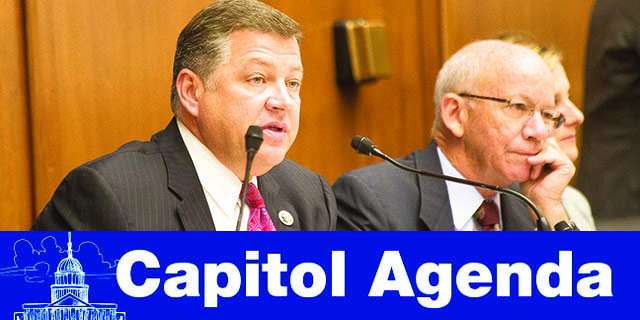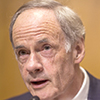Senior Reporter
Capitol Agenda for the Week of March 5: Amos & Adam

The country’s struggle to identify an ideal funding strategy for transportation projects has brought to the fore two men who, until now, had little in common.
Meet Amos Switzer and Adam Smith, the archetypes the House transportation leaders call up when making the case for increased funding for infrastructure projects.
Switzer, an Oklahoma farmer from the 1950s, embodies everything that is wrong with President Donald Trump’s infrastructure pitch, according to Rep. Peter DeFazio (D-Ore.). Especially the part about shifting greater authority to states and the private sector. This concept is known as devolution.
DeFazio frequently frames his archetype using a prominent Life magazine article that featured a photograph of Switzer’s arid field. On one side there is a finished highway, and on the other an unpaved road. The takeaway, from DeFazio’s vantage point, is obvious. A nationwide network of roads could only be achieved thanks to a federation. States alone could not have coordinated interstate roads.
“When Kansas started their project, Oklahoma said, ‘Oh yeah. We’ll build it too.’ And then they said, ‘Ah, God, we’re sorry. We got some economic problems here. We can’t build it.’ So for several years they built a big wooden barrier here. People crashed through it. Amos had to tow people out of his field. I mean this went on for three years until Dwight David Eisenhower, a Republican, joined with the Congress, and said, ‘No. We’re going to have a funded, by a user fee, a funded national transportation network,’” DeFazio explained Feb. 8 on Capitol Hill. He and his Democratic colleagues had just unveiled their own infrastructure funding plan.
Twenty days later, keynoting the American Association of State Highway and Transportation Officials’ conference in Washington, DeFazio held up a poster of Switzer’s farm. The caption: “Devolution.”
Smith, an economist during the Enlightenment, is Transportation and Infrastructure Committee Chairman Bill Shuster’s oracle of choice. Nearly two centuries before Switzer’s farm gained notoriety, Smith’s “Wealth of Nations” forced a rethink of monetary value systems. The tome is credited with formulating, and popularizing, capitalism. Throughout his chairmanship, Shuster (R-Pa.) often quoted Smith. An excerpt of the economist’s writings decorate the committee’s hearing room across from the U.S. Capitol.
Shuster’s fascination stems from Smith’s argument that a government’s role is to build and maintain corridors that would facilitate commerce.
Smith explained: “The expense of making and maintaining the public roads of any country must evidently increase with the annual produce of the land and labour of that country, or with the quantity and weight of the goods which it becomes necessary to fetch and carry upon those roads.”
The motivation on the part of DeFazio and Shuster to call up the archetypes may be well-meaning. However, promoting personalities from bygone eras may at times simplify or distort present day arguments. A significant number of scholars and political scientists have debated the historical significance of Switzer’s farm and Smith’s theory.
The case study of Switzer’s farm, for instance, struck a chord post-World War II. Back then, national security concerns prompted the impetus for the mammoth federal role in transportation affairs. But, nowadays, most funding woes are no longer rooted on whether a federal government should connect the nation. Turning to Smith, when we last checked, capitalism became a worldwide phenomenon. There is hardly a politician in America who would publicly promote replacing the capitalist society with Marxism. And Smith’s ideal infrastructure prevailed.
The debate happening now is quite more complicated. Technological advancements and Kafkaesque networks of regulation are undeniable. Identifying strategies that best utilize existing state and federal budgets, as well private investors, is the new challenge.
THE WEEK AHEAD: (all times ET)
March 6, 10 a.m.: The House Transportation and Infrastructure Committee hosts Transportation Secretary Elaine Chao.
March 6, 10 a.m.: The House Health and Technology Subcommittee, and Agriculture, Energy and Trade Subcommittee meet jointly on: “Disconnected: Rural Broadband and the Business Case for Small Carriers.”
March 6, 10 a.m.: The House Interior, Energy and Environment Subcommittee meets on: “Examining the U.S. Army Corps of Engineers.”
March 7, 8 a.m.: The Ripon Society schedules a discussion with Sen. Jerry Moran (R-Kan.) on NAFTA.
March 7, 10 a.m.: The House Highways and Transit Subcommittee hosts a hearing on infrastructure funding with American Trucking Associations President Chris Spear, U.S. Chamber of Commerce's Transportation and Infrastructure Division Executive Director Ed Mortimer, and Tennessee Department of Transportation Commissioner John Schroer
March 7, 10:15 a.m.: The House Environment Subcommittee holds a hearing on “The Future of Transportation Fuels and Vehicles.”
IN CASE YOU MISSED IT:
AUTOMATE: The newest version of automated commercial and passenger vehicle federal guidance for manufacturers and states seeking to deploy the self-driving vehicles could be released as early as summer, U.S. Transportation Secretary Elaine Chao told a group of 400 executives who gathered here for a “summit” on automated vehicle policy.
ELDs: The Federal Motor Carrier Safety Administration has issued a new slate of guidelines to mitigate confusion over whether livestock haulers, including those who transport their horses, are required to install electronic logging devices on their trucks or possess a commercial driver license.
OMNITRACS: The company announced plans to launch a unified software platform for its mobile communications systems, a move designed to provide fleets with greater flexibility during a time of rapid change for the trucking industry.
 BUZZ:
BUZZ:

Pessimism looms large on Capitol Hill. A good number of congressional staffers and transportation lobbyists tell Transport Topics they don’t see policymakers advancing an infrastructure bill this year.
WHAT WE’RE READING:
Eno Center for Transportation senior fellow Jeff Davis deconstructs Penn Wharton Budget Model’s analysis.
FAVORITE QUOTE:
Given the need that we have in this country, the hole that we’re in; the holes that are in our roads and our bridges, and so forth. If we can’t come to a consensus this time, this year, shame on us. Shame on the White House.
Sen. Tom Carper (D-Del.), at the American Association of State Highway and Transportation Officials annual conference Feb. 28
FAVORITE VIDEO:
It’s a rural thing.
FAVORITE TWEET:
DJ G-Money on the ones-and-twos.
DJ Gribbin tells state transportation officials: “we do need a long-term solution to the Highway Trust Fund.” Says the administration understands the value of the HTF. Also reiterates White House is not for or against gas tax increase and remains “wide open to it.” — Bill Lucia (@bill_lucia) March 1, 2018
Thank you for reading Capitol Agenda. We publish Tuesdays when Congress is in session. E-mail emulero@ttnews.com with tips. Follow @eugenemulero and @transporttopics on Twitter.


